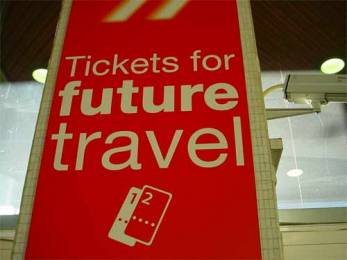
Airlines, hotels, travel & tourism
Flying in the face of convention
As the author William Gibson once remarked, 'the future is already here, it's just unevenly distributed'. And so with the future of flying. Many of tomorrow's innovations are already here, it's just that they've been unevenly implemented or tested in relatively small areas. IATA's plan for the future entitled 'Simplifying the Business' covers four areas; ticketing; check-in; boarding; and baggage handling. The first ambition is to end paper ticketing by 2007. Of the 1.8 billion people who flew in 2004, 65% still use paper tickets (at a cost of US $10 per ticket) although in the US 80% of flyers already use e-tickets (at a cost of US $1 per ticket). Getting rid of paper not only saves money, it also means that check-in procedures can be revolutionised. With e-tickets check-in can be made at home via the Internet, from your hotel via reception, or through a self-service kiosk (which could also check you out of your hotel). Boarding passes will also go virtual with passengers simply presenting a bar-code printed out at home or displayed on their mobile phone. The use of mobiles also means that passengers can be sent text reminders to go to the gate (or possibly ads to go to duty free). As for baggage this is a bit more complicated. Bags are currently given bar-coded tags, but the new plan is to change to Radio Frequency Identification Tags (RFIDs), which in theory will solve the problem of lost luggage which costs airlines US$ 1 billion a year. None of these technologies is totally new and all have been tested by a few individual airlines. The problem is therefore implementing these changes and, critically, integrating systems across all carriers globally. The other issue is whether airline customers actually want such changes. Most of these innovations are cost-driven and the benefits to customers are negligible unless you are flying low-cost or you're in a hurry. There are even instances of long queues forming at self-check-in kiosks, which rather defeats the whole purpose. Being industry standard these changes also reduce differentiation which airlines are so desperately seeking.
Ref: The Economist Technology Quarterly (UK) March 2005. 'Change is in the air'. www.economist.com
Travel fads
You read it here first and probably last. The latest travel fads apparently include 'experimental travel' where tourists randomly ask complete strangers to suggest places to visit. Another rather fun idea is 'retro-tourism'. This is where people use old and outdated travel guides from 10, 20 or even 100 years ago to explore the local area in the full knowledge that parts of the information will be out of date or completely useless. Retro-tourism can also include using the slowest possible means of transport to travel to and from your destination. There is also 'ero-tourism' where a couple travel separately to a city or town and then use instinct and serendipity to find each other. Apparently, the point, according to the Laboratory of Experimental Tourism (seriously) is to create an 'erotic pursuit'. Other rather playful ideas include 'K2 tours' where people pick a grid reference on a map at random and 'monopoly tourism' where, you guessed it, people visit the places on a monopoly board using the dice to create randomness.
Ref: The Times (UK), The Next Big Thing ¨ Experimental Travel, D.Ronwan. www.thetimes.co.uk
Wildlife without people
What do you get if you cross global tourism with environmentalism? In at least one case the answer is environmental fascism. For example, over in Ethiopia the government, working with a private Dutch organisation called the African Parks Foundation, recently threw 5,000 local people and their animals off their land to turn the area into a wildlife park for foreign tourists. No compensation was offered and an electric fence has been installed as much to keep local people out as to keep local animals in. Whilst not exactly a trend, this could be an early example of the shape of things to come in Eco-tourism, as the need to earn foreign currency forces countries (and companies) to bend the ethical rules.
Ref: New Scientist (UK) 16 April 2005 'Big Game losers', F.Pearce. www.newscientist.com
Tourist tech
Visitors to Tokyo earlier this year were given free digital tour guides as part of a campaign by the Ministry of Land, Infrastructure and Transport to address the country's tourist imbalance. Last year visitors to Kyoto were given free mobile phones as part of a similar promotion to attract foreign tourists to the city. The digital assistants (PDAs) were pre-programmed with maps of the city, language translation software and voice applications. Currently Japan receives just 5 million foreign visits per year compared with 16 million Japanese who travel abroad.
Ref: Sydney Morning Herald 26-27 February 2005. 'Japan's high-tech tourist trap', D.Cameron. www.smh.com.au
Grey Nomads and Grey Geese
The cost of funding a long retirement is giving rise to two new phenomena. Grey Nomads is the term being given to people who grow up and work in one country but decide to retire in another. British retirees have long sought to colonise certain parts of France and Spain, but the trend is now going global and moving further afield spawning websites such as retireoverseas.com and liveabroad.com. Real estate agents in some parts of Australia report that 15-20% of sales are now made to retired people from overseas who are seeking sunshine and a lower priced lifestyle. In Australia the number of retirement visas being issued by the Department of Immigration has doubled since 2000 as has the number of people leaving Australia to retire in another country. On a more collective level Grey Geese is a new term being applied to groups of elderly tourists (often, but not exclusively, American) who travel in packs to keep down costs and increase safety.
Ref: Australian Financial Review (AUS) 9-100 April 2005. 'Grey Nomads go global', D.Macken. www.afr.com.au
